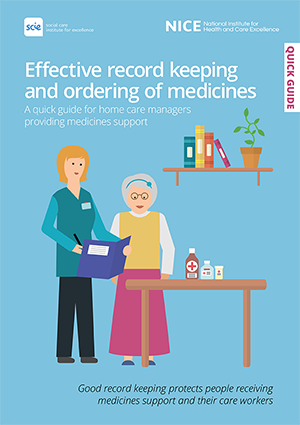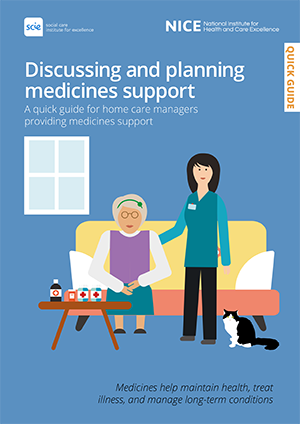Up to 1 in 10 hospital admissions in older people are medicines related. As many as 50% of people don’t take their medicines as intended. The risk of medicines-related problems can be reduced by supporting health and social care staff, people receiving social care and their families and carers to manage medicines effectively.
Many people receiving social care have multiple long-term conditions. It’s important that people who are able to take and look after their own medicines are receiving all the help they need. It’s also important to make sure health and social care staff can assess people’s medicines support needs, and systems and processes are in place to make sure that people receive the medicines they need in a safe and effective way.
We've published guidance and quality standards on managing medicines for adults receiving social care in care homes and in the community. These examples show how our guidance has been used to improve care and support.
Using NICE guidance to help manage medicines in the community
Castle Supported Living, a homecare provider, used our guidance to help them improve the support they give to adults with a learning disability. They carried out a baseline assessment of their service against our guideline and put in place our recommendations such as identifying a medicines lead. They discovered that staff needed and wanted more training. All staff, including managers, have now received training and competency assessments.
After carrying out medicine support assessments, every person they support now has a detailed plan and easy-read information about their medicines. The organisation had support from other professionals during the process and this has led to increased partnership working with GPs, community pharmacists and the local medicines support team.
NICEimpact adult social care:
- Introduction
- People's experience of care and support
- Managing medicines
- Intermediate care including reablement
- Using our quality standards to improve adult social care
- Commentary
- Published July 2019
We've produced quick guides for home care managers providing medicines support. They are an easy way to access the key recommendations from our guidance. They cover discussing and planning medicines support and effective record keeping and ordering of medicines.
More details about these and other shared learning examples are available on the tools and resources pages for our guidelines on managing medicines in care homes and the community.
You can also find links to helpful resources such as our baseline assessment tools, a webinar, and e-learning courses which have been endorsed by NICE.
The medicines management in care homes e-modules from PrescQIPP were a fantastic development resource.
Managing medicines in care homes
In Wigan, a team of pharmacists and pharmacy technicians helped local care homes improve their management of medicines. This has been reflected in better Care Quality Commission (CQC) ratings in 13 homes. The project was supported by one of our medicines and prescribing associates; a group of professionals who work with us to help support and promote high quality, safe, cost-effective prescribing and medicines optimisation.
The team worked with residential and nursing homes and local GPs to carry out structured medicine reviews for people living in care homes. In under 3 years the team completed medicine reviews for 749 people. They made an average of 4 recommendations per person, such as stopping medicines or changing the dose.
The NICE medicines management guideline, and associated tools and resources, have supported development of our knowledge, skills, competencies and medicines processes. We’ve improved our compliance against both internal and external audit from 76% to 99%, which has been sustained over the last 12 months. I would definitely recommend this guideline and resources, including free access to the BNF online. It has improved our practice significantly.
Feedback from GPs, the local authority and CQC inspection reports suggested that staff in some care homes needed more support with the safe use and handling of medicines. The team carried out baseline assessments of care homes against our guideline. They then supported 29 care homes to put NICE guidance into practice, helping with areas such as documentation, medicines storage and the management of controlled drugs.
Supporting people to put our guidance into practice
Our medicines team produced resources and training for NICE associates on our guidelines on managing medicines for adults receiving social care in care homes and in the community. They discussed local implementation plans at regional meetings and shared examples of good practice with the group at national training days.
Associates have worked on a range of local and national projects in social care including:
- patient-led medication reviews
- development of local policies and assessment tools
- nationally available e-learning packages for care workers developed for Skills for Care.
Our medicines implementation consultants, working with the NICE field team, have delivered training on how we support quality and safety in social care to staff working in care homes and social care across England.

